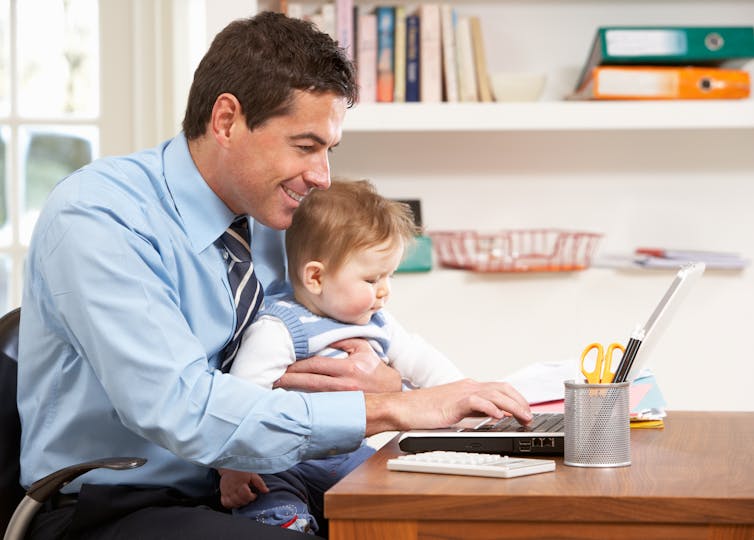How did Quebec get 4 in 5 dads to take parental leave?
Québec’s provincial insurance plan that provides fathers with paternity leave has had a major impact on fatherhood.
This article by Diane-Gabrielle Trembaly of the TÉLUQ University was originally published at The Conversation.

Diane-Gabrielle Tremblay, Université TÉLUQ
Until 2006, only one in five Québec fathers took a few days of parental leave, compared with 10 to 15 per cent of Canadian fathers outside the province. Today, 80 per cent of Québec dads stop working when a child arrives so they can help care for their little one for several weeks.
That’s because the Québec Parental Insurance Plan (QPIP) replaced Canadian parental leave in the province in 2006 and it has had a major impact on new fathers. It introduced paternity leave reserved for them alone, and not transferable to the mother.
Québec fathers quickly took advantage of this. The leave is three to five weeks (better paid in the first case because it is shorter). Three-quarters take the five-week leave, and some extend it by taking part of the one-year parental leave, which can be shared with the mother.
For the past two decades, I have been conducting research with colleagues on work-life balance, or work vs. personal-family life. Initially, it focused on work-life conflicts and how it could create tensions.
Then I became interested in the measures that companies have put in place to facilitate the integration between the various spheres of life. Through the research, I have found that a favourable organisational climate must exist for employees to demand and benefit from existing integration measures. Also, our studies have shown that the support of the spouse, when there is one, is the determining factor in facilitating work-life balance.
Big changes
The QPIP has introduced major innovations in the workplace. In the early 2000s, fathers were reluctant to take parental leave, even though they could share Canadian leave with the mother. But since 2006, with the QPIP, fathers take a break more easily and feel more legitimate in doing so.
Certainly, it is mainly women who take most of the parental leave, especially in traditionally female sectors. They take an average of 29 weeks off.
Nevertheless, the change is undeniable, as we have seen with the figures mentioned above. Of the 80 per cent of fathers who take the parental leave which is strictly for them, about one-third also take weeks of parental leave, which they can share with the mother. Thus, they currently enjoy an average of seven weeks off although those taking paternity leave and part of the parental leave can take up to 13 weeks off on average.
The presence of fathers with their newborn child brings about changes, especially within the family, in the gender division of labour. Following the leave, fathers become more active in child rearing and household chores.

Resistance in the workplace
Our research has shown great progress in less than 15 years, but also some challenges for fathers who want to fully assume their role.
Not all workplaces seem to have evolved as much as families have. Indeed, there is some resistance in Québec as in the Nordic countries, including Sweden, the precursor of paternity leave.
Fathers sometimes have to negotiate with their employer to be able to take the leave when they want, and for as long as they want (that is, take part of the parental leave in addition to paternity leave).
Some workplaces present more challenges for those who wish to take longer absences or reduced hours at work for a few years, for example, to be more present with their children.
Colleagues and employers also sometimes show some reluctance, even resistance, by asking the father to work a little during his leave — which some will even call “holidays!”
As well, some employers are not shy about calling or emailing fathers on paternity leave, asking them to do some work, spend a few hours in the office or complete a project because no one else could apparently do it.

Sometimes the father is asked to postpone his weeks of leave to a time when his services are not as in demand. The employer also may prefer the paternity leave to not exceed three to five weeks.
While this may have an impact on their careers or on workplace promotions, as is often the case for women, the fact remains that many men claim their right to take this leave.
Few experience serious problems
In all our research, only one father has experienced serious career-related problems. He said his boss hated him and that he was seen as an “absolute pariah,” because he took paternity leave. Another said he had an unpleasant surprise when he returned to work, discovering the company had replaced him in his job and this caused some conflict.
However, the situation of Québec fathers is much more advantageous than that observed in other countries, particularly in Japan, where it is frowned upon for fathers to take leave.
It is rare that women are bothered during their leave. On the one hand, those with low wages will return to work as soon as possible. At the other end of the spectrum, for those in professional and managerial environments, the company may want an employee to maintain contact with customers. Sometimes it is the new mothers who do it right away, knowing that the employer will not necessarily keep their files for them. They don’t want to risk losing them and having to start all over again when they return.
Paternity leave therefore seems to have been well accepted in Québec, despite some resistance. The success is undeniable. If there are constraints, they are often self-imposed, especially among managers and professionals, who wish to maintain a link with their work while taking on the new job of being a parent to their child.![]()
Diane-Gabrielle Tremblay, Professeure à l'Université TELUQ, Université du Québec, directrice de l'ARUC sur la gestion des âges et des temps sociaux et de la Chaire de recherche du Canada sur l'économie du savoir, Université TÉLUQ
This article is republished from The Conversation under a Creative Commons license. Read the original article.
TAKE ACTION FOR MEN'S HEALTH:
Read: Australia trails the world in parental leave (AMHF)
Read: Australia must do more to support new dads says report (AMHF)
Read: Want men to share parental leave? Just give them equality (The Guardian)
White Paper: Advancing Parental Leave Equality (Parents At Work)
Website: Parents At Work
Insight Paper: Parental leave and gender equality (WGEA)
